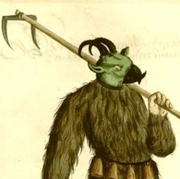|
I once started making a C-SPAM/Trump themed tarot deck but I didn't get very far. Nevertheless I am posting those here because they seem relevant: 
|
|
|
|

|
| # ¿ May 11, 2024 11:13 |
|
smarxist posted:haha, these are awesome, i wonder if we brainstormed a full set if snoo would be up to drawing it >_> well, it's tricky, I was just gonna make up new stuff, but if you make a whole new set you need a whole new mythology for each card so it's easier to tie it to the existing tarot deck, and then you need four suits, and 9 of each of those, and it gets daunting to imagine how the 3 of hamburgers would be different from the 4 of hamburgers
|
|
|
|
Crane Fist posted:drat sorry for my lack of understanding of this completely fake thing, maybe you can recommend me some imaginary reading material on the subject It is widely known that the first American colonists were murderously superstitious, but fortunetelling, the occult, and western esotericism was no less prominent in later periods of American history. From immigrants living in tenements to African Americans in the post-Civil-War South to traveling carnivals, fortunetellers were often not only working-class people working for working class people, but also often disenfranchised people from the fringes of mainstream society. Some were in it for the grift, sure, but others served a role akin to a therapist for the poor, helping people think about their lives in new ways or to make difficult decisions. In some cases this was a cherished role in the community, and in some places (like New Orleans), this tradition has become so strong as to form a key part of local cultural identity. There are of course Marxist critiques of the sort that would be more in line with Taintrunner’s posting here, such as Theodor Adorno’s critique of astrology: quote:The doctrine of the existence of the Spirit, the ultimate exaltation of bourgeois consciousness, consequently bore teleologically within it the belief in spirits, its ultimate degradation. The shift to existence, always "positive" and justifying the world, implies at the same time the thesis of the positivity of mind, pinning it down, transposing the absolute into appearance. Whether the whole objective world, as "product", is to be spirit, or a particular thing a particular spirit, ceases to matter, and the world-spirit becomes the supreme Spirit, the guardian angel of the established, despiritualized order. On this the occultists live: their mysticism is the enfant terrible of the mystical moment in Hegel. And then there are critiques of the critiques. From an essay on the economics of fortune telling certification programs: quote:Hardly fraudulent, the contemporary psychic practitioner performs an increasingly pervasive form of labor in American society. Part life-coach, part spiritual mentor, their work capitalizes on the conditions of everyday life, particularly as the quest for personal well-being comes to stand in for more structural promises of long-term security. They may, perhaps, be the quintessential affective laborers: those who sell their very capacity to produce in you the feeling that you exist — that you can be recognized, read, interpreted, and advised. But in any case we find that fortunetelling and the occult can be a rich grounds of discussion, even when commenting on economic systems in the abstract: quote:What is perhaps most salient within the history of fortune-telling is the way it both reifies and subverts capitalist economics. Its subversion can be seen when one thinks of the ideological scandal that would ensue if one indeed had the ability to predict the outcome of the lottery, a feature of most capitalist societies. The capitalist ethos of self-mastery is undermined by the possibility of luck leading to success without proportional labor. As a result, games of luck tend to be sidelined in capitalist societies, looked down upon as pastimes of the poor and lazy. And all this without even mentioning the interesting history of things such as the tarot deck itself, the development of particular traditions, and the transmission of these ideas and practices. twoday has issued a correction as of 20:39 on Jan 3, 2021 |
|
|





